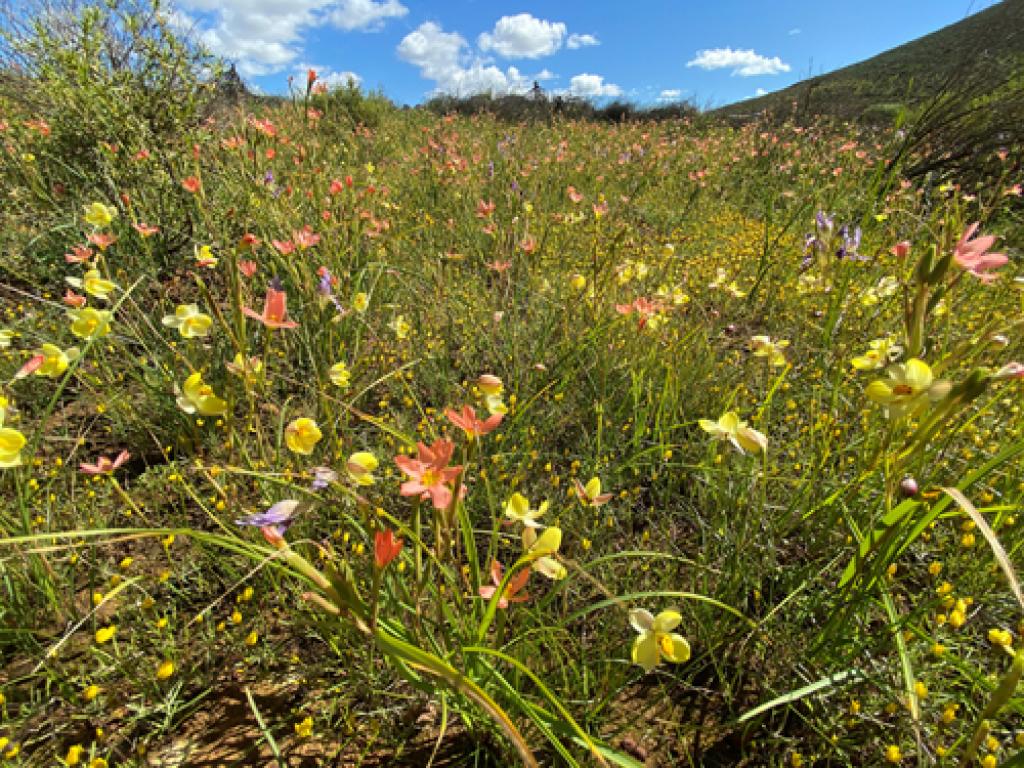MCB's Nicci Illing and Rob Ingle scoop Human Frontier Science Program Award


Illing said: “Within the next three years, the research team will investigate the genetics of how symmetry is broken in mirror-image flowers of two endemic South African plants, Wachendorfia paniculata and Cyanella alba and compare this to Heteranthera multiflora, found across the Americas.”
The Human Frontier Science Program (HFSP) funds international teams of scientists who wish to combine their expertise in innovative approaches to address questions related to complex mechanisms of living organisms. The goal of this successful HFSP team will be to link structural determinants of left-right asymmetry in flowers to ecology and evolution.
The project emerged after Illing and Professor Michael Lenhard spent time exploring areas of potential collaboration while Illing was on sabbatical in Potsdam in 2019. Other team members include Dr Eva Deinum of the Department of Mathematical and Statistical Methods, Wageningen University and Research, The Netherlands and Professor Spencer Barrett (Department of Ecology and Evolutionary Biology, University of Toronto, Canada).
The body plans of most animals and plants are symmetrical. The molecular and genetic mechanisms by which this symmetry is broken, for example the placing of internal organs in the human body, or the asymmetrical placing of reproductive organs in flowers has long fascinated biologists. In plants showing left-right floral asymmetry, two forms of flowers are found: In one the female style is bent to the left, in the other to the right, and in many cases, the pollen-producing anthers are on the opposite side.
While in some species, such as the African Violet, both flower forms occur on the same individual, Professor Illing and her colleagues are interested in cases where an individual has only left- or only right-handed flowers, respectively. They know that the direction of style bending is genetically determined as half the population of plants bare only left-handed flowers and the other half right-handed flowers.
“The big question we want to answer is how a difference in DNA leads to a reproducible directional decision by floral organs during development. Moreover, the example of mirrorsymmetric flowers provides an opportunity to link the molecular control of left-right asymmetry to direct ecological consequences. In particular, this is thought to be an adaptation that promotes efficient outbreeding between individuals of a species,” added Illing.
At UCT, Illing will be collaborating with Associate Professor Robert Ingle of the Department of Molecular and Cell Biology and Professor Dirk Lang of the Department of Human Biology to pinpoint the genes involved in floral asymmetry and to characterize the developmental sequence of floral development and the first point at which symmetry is broken in Wachendorfia paniculata and Cyanella alba. Professor Bruce Andersen from the Department of Biological Sciences at the University of Stellenbosch will also be contributing ecological expertise in the field studying the movement of pollen by insects.
About HFSP
HFSP is an international program of research support implemented by the International Human Frontier Science Program Organization based in Strasbourg. Its aims are to promote intercontinental collaboration and training in cutting-edge, interdisciplinary and risky research focused on the life sciences. Research grants are provided for teams of scientists from different countries who wish to combine their expertise in innovative approaches to address questions that could not be answered by individual laboratories.
Website HFSP Awardees: https://www.hfsp.org/awardees/newly-awarded
Contact:
Professor Nicola Illing, Department of Molecular and Cell Biology, UCT
Phone: 072 6130897
E-Mail: Nicola.Illing@uct.ac.za
Issued by: UCT Communication and Marketing Department
Aamirah Sonday
Media Liaison and Monitoring Officer
Communication and Marketing Department
University of Cape Town
Rondebosch
Tel: (021) 650 5427
Email: aamirah.sonday@uct.ac.za
Website: www.uct.ac.za
